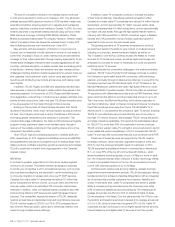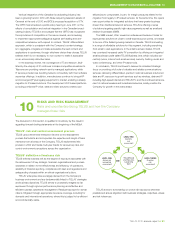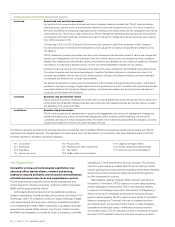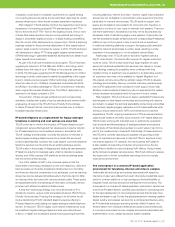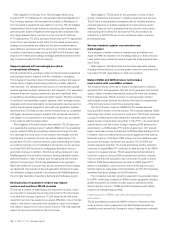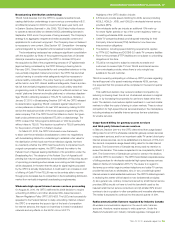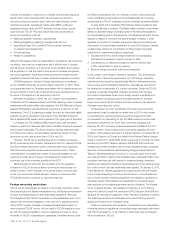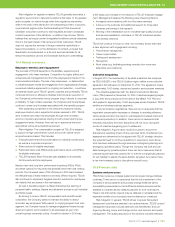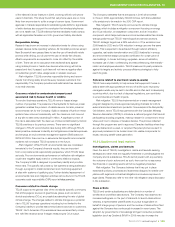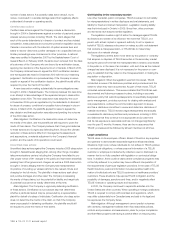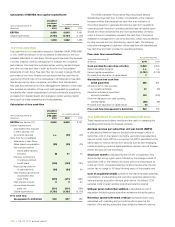Telus 2010 Annual Report Download - page 104
Download and view the complete annual report
Please find page 104 of the 2010 Telus annual report below. You can navigate through the pages in the report by either clicking on the pages listed below, or by using the keyword search tool below to find specific information within the annual report.100 . TELUS 2010 annual report
the Telecommunications Act or to maintain, renew or secure licences
under the Radiocommunication Act and Broadcasting Act could be
jeopardized and TELUS’ business could be materially adversely affected.
In June 2008, the Competition Policy Review Panel provided its final
report to the Minister of Industry. The Panel made a number of recommen-
dations to liberalize foreign ownership rules for the telecommunications
and broadcasting sectors. Subsequently, the federal government Throne
Speech on March 3, 2010 and the federal budget on March 4, 2010
signalled an intention to consider opening the telecommunications ser-
vices sector to further foreign investment. In June 2010, Industry Canada
unveiled three options for consultation on lifting foreign ownership
restrictions for telecommunications companies:
1. Increase the limit for direct foreign investment in broadcasting
and telecommunications common carriers to 49%
2. Lift restrictions on telecommunications common carriers with
a 10% market share or less, by revenue
3. Remove foreign ownership restrictions completely.
In the context of the Industry Canada consultation, TELUS advanced
a fourth option: Should the government opt to lift foreign ownership
restrictions, they should be symmetrically lifted for all telecommunica-
tions carriers and broadcasting distribution undertakings, and should
be retained for broadcasters (i.e. content providers). Under the TELUS
proposal, a vertically integrated company operating both carriage
and content businesses could not be foreign owned. A vertically inte-
grated company choosing to sell its carriage business to a foreign
buyer must ensure that the content business remains under separate
Canadian ownership and control.
On November 22, 2010, the Minister of Industry announced the
government’s intent to address the matter later in 2011 in the context
of rule setting for upcoming spectrum auctions expected in 2012.
A consultation on rule setting for the 700 MHz spectrum auction was
launched on November 30, 2010, with comments accepted until
February 28, 2011, and reply comments accepted until March 30, 2011.
In the interim, there remains some uncertainty regarding the inter-
pretation of the existing rules due to a Cabinet decision. On December 10,
2009, the Governor in Council (on behalf of the Federal Cabinet) issued
Order in Council P.C. 2009-2008, which overturned an October 29, 2009
decision by the CRTC (Telecom Decision 2009-678) that found that
wireless new entrant Globalive did not meet Canada’s foreign ownership
laws due to the substantial capital backing of Egypt-based Orascom
Telecom. Notwithstanding the Governor in Council’s claim that its deci-
sion was particular to facts of the Globalive case, it appeared that a new
precedent had been set with respect to loosening foreign ownership
restrictions in telecommunications, broadcasting and other sectors where
the “control in fact” test has traditionally been applied. On January 8, 2010,
Public Mobile Inc. filed an application for judicial review with the Federal
Court of Appeal seeking to overturn the Governor in Council’s Decem
-
ber 10, 2009, decision declaring Globalive to be eligible to operate as a
Canadian carrier. Public Mobile Inc.’s application for a judicial review
was opposed by the federal government and by Globalive. The Federal
Court of Appeal decision was released on February 4, 2011, striking
down the Order in Council that overturned CRTC Decision 2009-678 and
issuing a 45-day stay of judgement, which Globalive is seeking to extend.
The federal government and Globalive announced that they intend to
appeal the Federal Court of Appeal ruling.
There is no assurance that resolution of uncertainty over interpretation
of existing laws and regulations concerning foreign ownership restrictions
that TELUS is subject to, or the manner in which they may be changed,
will be beneficial to TELUS.
controls the allocation of spectrum in Canada, and licenses frequency
bands and/or radio channels within various frequency bands to
service providers and private users. Voice and data wireless commu-
nications via cellular, specialized mobile radio (SMR), enhanced
specialized mobile radio and PCS systems, among others, require
such licences. TELUS’ PCS and cellular licences include various
terms and conditions, such as:
.Meeting Canadian ownership requirements
.Meeting obligations regarding coverage and build-out
.Spending at least 2% of certain PCS and cellular revenues
on research and development
.Annual reporting
.Resale to competitors.
While TELUS believes that it is substantially in compliance with its licence
conditions, there can be no assurance that it will be found to comply
with all licence conditions, or if found not to be compliant that a waiver
will be granted, or that the costs to be incurred to achieve compliance
will not be significant. Initial licence fees and annual renewal fees are
payable for licences that have not been obtained via spectrum auction.
700 MHz spectrum: Industry Canada has initiated a consultation
on the 700 MHz band with an auction likely in late 2011 or 2012. There
is no guarantee that the Canadian government will not reserve spectrum
for new entrants or that it will not adopt some open access provisions
for some of this spectrum, as was done in the U.S.
800 MHz re-banding: In 2004, the U.S. Federal Communications
Commission (FCC) released a Report and Order adopting a plan to resolve
interference with public safety radio systems in the 800 MHz band. Sprint-
Nextel’s iDEN system was identified as the primary contributor to this
interference. The U.S. is planning to realign the band so that public safety
systems would be relocated to the bottom of the 800 MHz band and
Sprint-Nextel’s iDEN system would operate in the upper part of the band.
In Canada, the TELUS Mike (iDEN) network also uses this same
frequency spectrum. Because each site for the Mike network is analyzed
and licensed individually, TELUS and Industry Canada have been able
to minimize the number of public safety interference issues to a few
across the country versus more than 1,500 in the U.S.
However, TELUS has an existing special co-ordination procedure
(SCP), endorsed by both Industry Canada and the FCC, wherein TELUS
and Sprint-Nextel utilize each other’s channels within their respective
iDEN networks at specific border areas across the country. These
channels serve to increase the number of channels available to both
networks to better serve the area. The realignment threatens the
continued use of the channels specified in the SCP.
While discussions with both the Canadian and U.S. regulators
indicate that TELUS should be able to continue to have access to a
certain number of SCP channels in the border areas, until such time
as the U.S. announces its final decision, there is no assurance that
TELUS will be able to continue to use these channels.
Foreign ownership restrictions
TELUS and its subsidiaries are subject to the foreign ownership restric-
tions imposed by the Telecommunications Act, the Radiocommunication
Act and the Broadcasting Act and associated regulations. Although
TELUS believes that TELUS Corporation and its subsidiaries are in com-
pliance with the relevant legislation, there can be no assurance that a
future CRTC, Industry Canada or Heritage Canada determination, or
events beyond TELUS’ control, will not result in TELUS ceasing to com-
ply with the relevant legislation. If such a development were to occur,
the ability of TELUS’ subsidiaries to operate as Canadian carriers under


